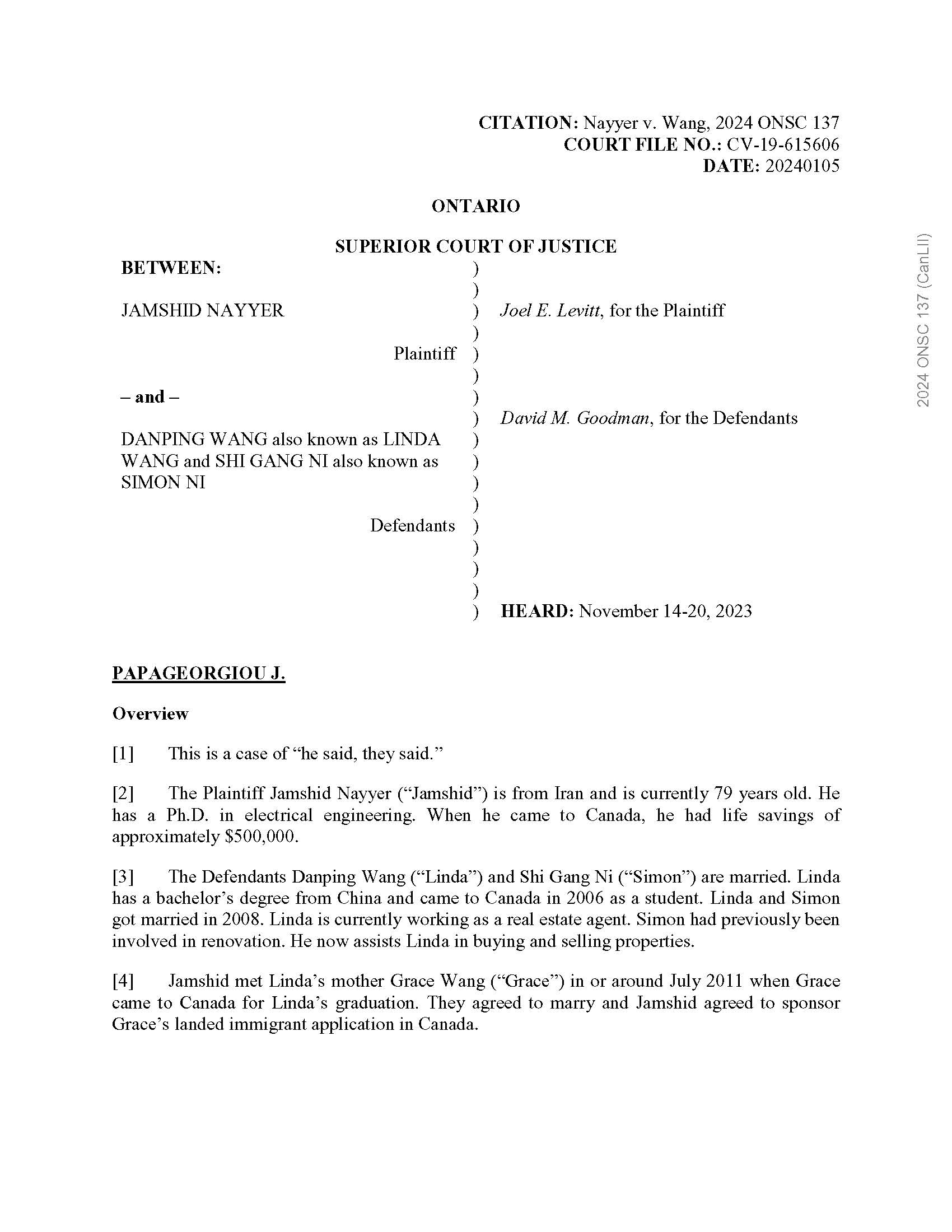

Lessons in Credibility from Nayyer v. Wang: When One Witness is Believed Over Three
Rikin Morzaria
Credibility is not a numbers game with the number of witnesses being the trump card. One credible witness can carry far more weight than 3 non-credible witnesses.
、


“I do not believe them.”
In a trial that turns on the credibility of the witnesses, that is the very last thing you want a judge to write when analyzing your side’s evidence. Unfortunately for the defendants in Nayyer v. Wang, 2024 ONSC 137 that’s exactly what Justice Papageorgiou had to say about them.
Let’s examine the facts and Justice Pagageorgiou’s reasons for finding the defendants not to be credible.
The plaintiff, Jamshid Nayyer, was a 79-year-old Iranian immigrant who married Grace Wang, the mother of the defendant Linda Wing. The other defendant was Linda’s husband, Simon Ni.
Jamshid Nayyer and Grace Wang lived together for roughly seven years and separated in 2018. Nayyer alleged that he entered into oral agreements with the defendants to receive a 20 percent interest in two properties they owned, in exchange for his payments towards their purchase price and maintenance costs. In total, Nayyer paid about $380,000. The defendants denied any such agreements and claimed that Nayyer only paid them rent and a dowry for Grace.
Nayyer commenced an action for breach of contract or, alternatively, unjust enrichment. He sought $555,000 in damages. Despite the fact that all three of the defendants testified that there was no agreement, Justice Papageorgiou accepted Nayyer’s evidence and granted him judgment of $555,000.
Despite the fact that the Defendants had three witnesses, all of whom testified in support of the Defendants’ position, Justice Papageorgiou did not believe their evidence because it was not consistent with contemporaneous documents and the timing of events.
Her specific credibility findings are instructive, both for counsel and witnesses:
Plaintiff (Jamshid Nayyer): The judge found him more believable because his evidence was more consistent with the contemporaneous documents and chronology. He also testified in a clear, cogent and consistent manner and did not waver or change his evidence under cross-examination. He was respectful and answered the questions directly.
Defendants, Linda Wang and Simon Ni: Their explanations lacked both documentary support and logical consistency. Their evidence was inconsistent with each other’s, inconsistent with Grace Wang’s, and inconsistent internally. Linda was evasive and gave shifting explanations. She seemed to be making things up when the cross-examination illustrated the improbability of what she was saying. She was not respectful, did not answer questions directly, and was argumentative. Linda reported a lease agreement to the police as a forgery, but later admitted she signed it. Simon was also evasive and failed to answer simple questions with direct answers. He also sought to distance himself from all of these events by testifying that his memory was not very good because of his health issues. They admitted that they did not properly report their income to CRA, which showed their willingness to be dishonest for their own financial purposes.
Defendant, Grace Wang: Her evidence appeared to be rehearsed, at one point giving a long compound answer with evidence containing essential elements to her position in response to a simple question. Like Linda and Simon, her evidence was contradicted by contemporaneous documents that supported Jamshid Nayyer’s position. Grace was extremely evasive when questioned about the report of fraud she and Linda made to the police regarding the lease. She also said she wanted to consult with Linda first before answering a relevant question. Finally, she was argumentative.
The lessons for witnesses who want to be believed are clear:
What are the requirements for becoming a Canadian citizen? To become a Canadian citizen, you…
Writing a letter of invitation doesn’t mean you’re legally responsible for the visitor once they…
As of January 28, 2025, Immigration, Refugees and Citizenship Canada (IRCC) has updated the health…
The Super Visa is a multiple-entry temporary resident visa (TRV), issued with a validity of…
The Super Visa is a multiple-entry temporary resident visa (TRV), issued with a validity of…
If you applied for a new temporary resident visa, or a study or temporary work…